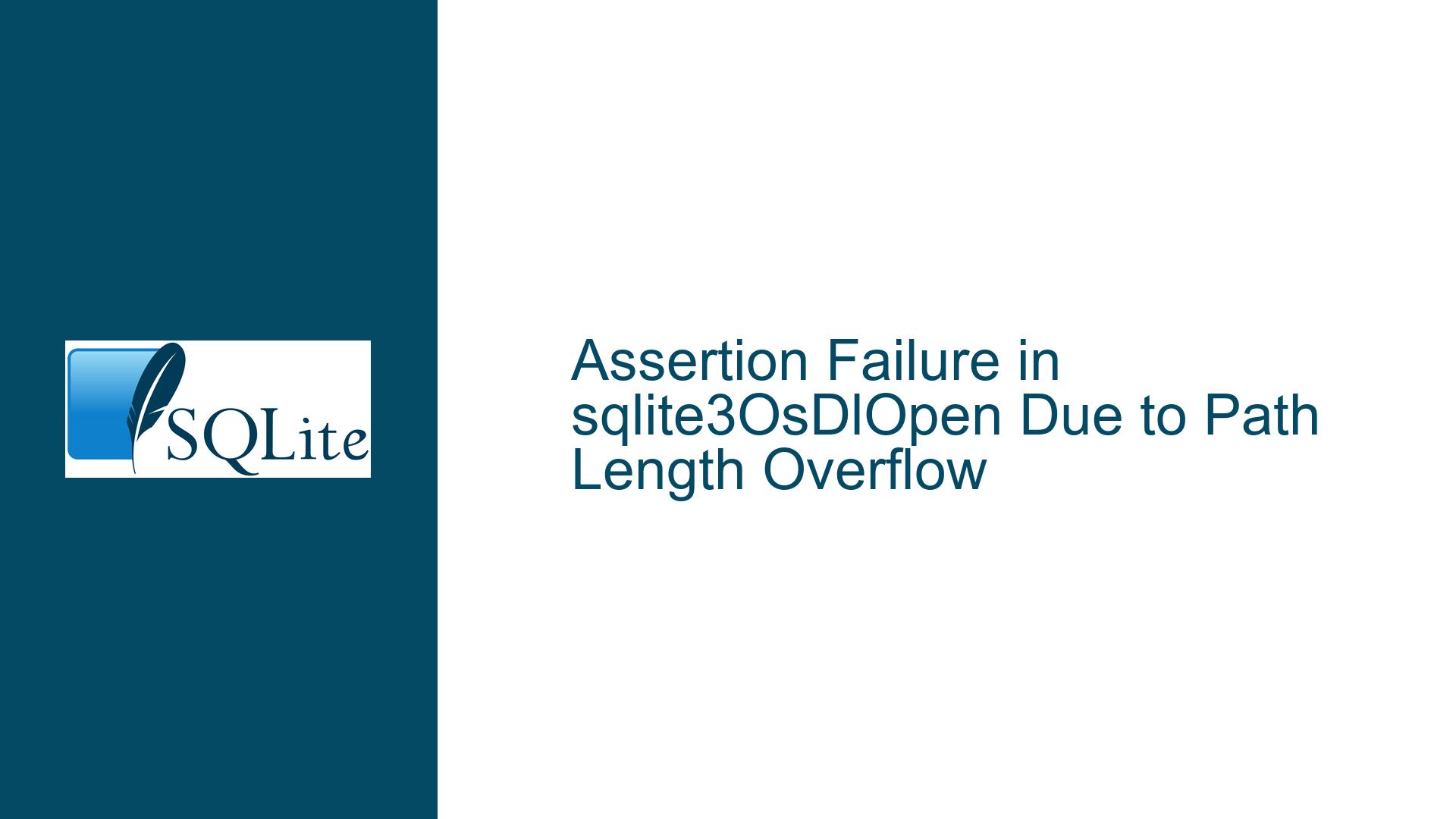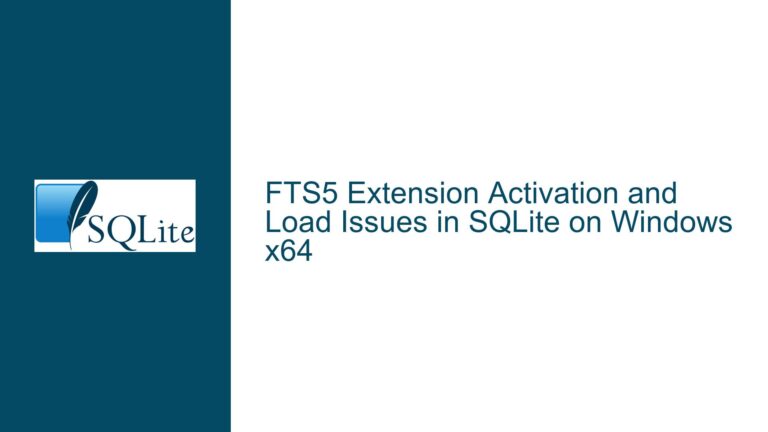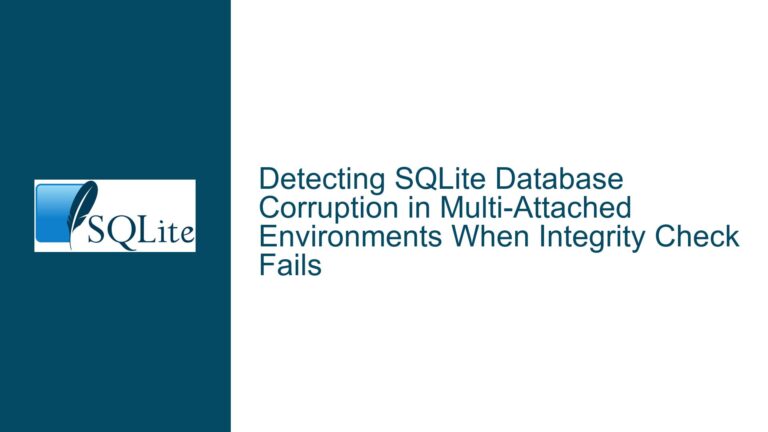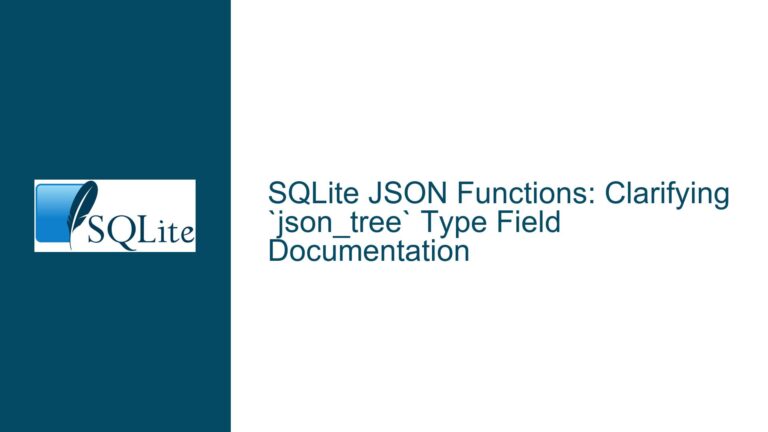Assertion Failure in sqlite3OsDlOpen Due to Path Length Overflow
Understanding the Assertion Failure in sqlite3OsDlOpen
The core issue revolves around an assertion failure in the sqlite3OsDlOpen function, specifically when the length of a dynamically generated file path (zAltFile) exceeds the predefined limit SQLITE_MAX_PATHLEN. This function is part of SQLite’s mechanism for loading extensions dynamically, and the failure occurs during the execution of a query that attempts to load an extension with an excessively long path.
The assertion failure is triggered by the condition strlen(zPath) <= SQLITE_MAX_PATHLEN, which ensures that the file path length does not exceed the maximum allowed limit. When this condition is violated, the program aborts, resulting in the observed error message. The issue is particularly notable because it involves a secondary path (zAltFile) generated from an already validated primary path (zFile). The secondary path is constructed by appending a file extension to the primary path, which can inadvertently push the total length beyond the allowed limit.
The problem is rooted in the way SQLite handles dynamic library loading. The sqlite3OsDlOpen function is called twice: once with the original file path (zFile) and again with a modified path (zAltFile). While the original path is checked for length compliance, the modified path is not subjected to the same validation, leading to the assertion failure.
Root Causes of the Path Length Overflow in sqlite3OsDlOpen
The primary cause of the issue lies in the unchecked length of the dynamically generated file path (zAltFile). The original file path (zFile) is validated to ensure it does not exceed SQLITE_MAX_PATHLEN, but the modified path (zAltFile) is not subjected to the same scrutiny. This oversight occurs because the modified path is constructed by appending a file extension to the original path, which can increase its length beyond the allowed limit.
The sqlite3OsDlOpen function is designed to handle file paths for dynamic library loading. It includes a safeguard to prevent oversize filenames from causing segmentation faults, as some dlopen() implementations are vulnerable to such issues. However, this safeguard is only applied to the original file path (zFile), not the modified path (zAltFile). As a result, when the modified path exceeds the maximum allowed length, the assertion fails, causing the program to abort.
Another contributing factor is the use of sqlite3_mprintf to construct the modified path. This function dynamically allocates memory for the new path but does not enforce any length constraints. While the original path is checked for length compliance, the modified path is generated without considering the additional length introduced by the appended file extension. This lack of validation creates a potential for overflow, especially when the original path is already close to the maximum allowed length.
The issue is further compounded by the fact that the modified path is used in a loop that attempts to load the extension with different file extensions. Each iteration of the loop generates a new modified path, increasing the likelihood of exceeding the maximum length. The loop continues until a valid handle is obtained or all possible extensions are exhausted, but it does not account for the possibility of path length overflow during this process.
Resolving the Path Length Overflow in sqlite3OsDlOpen
To address the path length overflow issue, several steps can be taken to ensure that both the original and modified file paths comply with the SQLITE_MAX_PATHLEN limit. These steps involve modifying the code to include additional validation for the modified path and implementing safeguards to prevent overflow.
Step 1: Validate the Modified Path Length
The first step is to introduce a length check for the modified path (zAltFile) before calling sqlite3OsDlOpen. This check should ensure that the total length of the modified path, including the appended file extension, does not exceed SQLITE_MAX_PATHLEN. If the modified path exceeds the limit, the function should skip the current iteration and proceed to the next possible extension.
Step 2: Modify the Path Construction Logic
The path construction logic should be updated to account for the additional length introduced by the file extension. This can be achieved by calculating the total length of the modified path before allocating memory for it. If the total length exceeds SQLITE_MAX_PATHLEN, the function should skip the current iteration and proceed to the next possible extension.
Step 3: Implement a Fallback Mechanism
In cases where the modified path exceeds the maximum allowed length, the function should implement a fallback mechanism to handle the overflow gracefully. This could involve truncating the original path to ensure that the modified path remains within the limit or using an alternative method to load the extension.
Step 4: Update the Documentation
The documentation should be updated to reflect the changes made to the path validation logic. This includes providing clear guidelines on the maximum allowed path length and the steps taken to prevent overflow. The documentation should also include examples of how to handle cases where the modified path exceeds the limit.
Step 5: Test the Changes
The changes should be thoroughly tested to ensure that they effectively prevent path length overflow and do not introduce new issues. This includes testing with various combinations of file paths and extensions to verify that the modified logic handles all cases correctly.
Step 6: Commit the Fix
Once the changes have been tested and verified, they should be committed to the codebase. The commit should include a detailed description of the changes made and the rationale behind them. This will help other developers understand the modifications and ensure that the issue does not recur in future versions.
By following these steps, the path length overflow issue in sqlite3OsDlOpen can be effectively resolved, ensuring that the function handles dynamic library loading safely and efficiently. The fix not only addresses the immediate problem but also strengthens the overall robustness of the SQLite codebase.
In conclusion, the assertion failure in sqlite3OsDlOpen is a critical issue that arises from unchecked path length overflow. By understanding the root causes and implementing the necessary fixes, developers can ensure that SQLite handles dynamic library loading securely and reliably. The steps outlined above provide a comprehensive approach to resolving the issue and preventing similar problems in the future.






